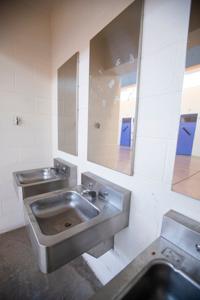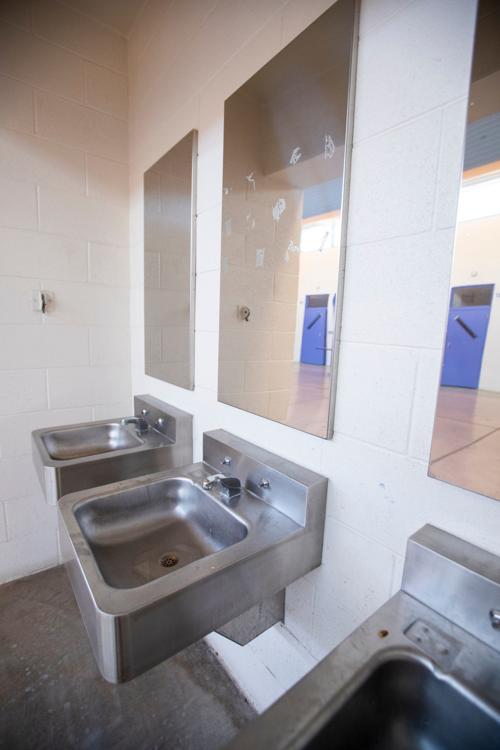Pima County officials say they need to use $327,000 in federal dollars to feed migrant families in the next five months, due to security restrictions at a juvenile detention center kitchen.
When county officials announced a tentative agreement last week to house the families in unused portions of the county’s juvenile detention complex, they pointed to $200,000 in federal funds that already were set aside for humanitarian aid.
The estimated cost for taking on that responsibility is now $530,000 over the next five months, according to a July 11 letter from Pima County Administrator Chuck Huckelberry.
The Board of Supervisors on Monday scheduled a July 22 emergency meeting to vote on leasing the facility to Catholic Community Services, which will oversee the aid efforts, for $100 per year.
The vote will come days before the former Benedictine Monastery in midtown Tucson, where thousands of asylum seekers have been housed since January, will be converted into residential and retail space.
Since January, Catholic Community Services has led a gargantuan aid effort at the former monastery.
Hundreds of local volunteers have flocked to the site and to local churches to provide a safe landing spot for thousands of families fleeing violence and poverty in Guatemala, Honduras, El Salvador, Brazil and other countries.
The families are processed and released by the Border Patrol and Immigration and Customs Enforcement.
They then spend a few days at the former monastery or smaller shelters before taking buses or planes to meet relatives or sponsors.
A spreadsheet at the former monastery on Friday showed 13,800 asylum seekers have been helped since last fall.
Volunteers have prepared thousands of meals in recent months, but the kitchen at the detention center is inside the secure part of the facility and volunteers will not have access, Huckelberry said in an interview.
The estimated costs include three meals per day for 250 people.
Catholic Community Services may provide one or more of those meals, which could lower the cost to taxpayers, Huckelberry said.
Catholic Community Services did not respond to requests from the Arizona Daily Star for comment.
Tucson City Councilman Steve Kozachik said the county was being “extremely generous” in taking on so many expenses.
If the county needs help with donated meals, “volunteers are willing to step up and do that,” Kozachik said. “It is nobody’s intent to offload this onto the county and walk away.”
He said the $327,000 was “not an outrageous number,” given the magnitude of people in need of help.
The county also plans to spend about $58,000 to make changes to the buildings at the detention center.
Those costs include:
- $25,000 for a bus turnaround area for ICE and Border Patrol buses
- $13,500 for two wall openings
- $7,500 to install a security door
- $3,000 on exterior signage
- $2,575 to install electrical outlets
- $2,500 to remove locking mechanisms from dorm rooms
- And $2,000 to install six cubicles
The county also would spend a total of $1,850 to disable and cover cameras; remove shower doors and install shower curtains; remove a basketball hoop; install light switches in each dorm room; and install recreation equipment.
The rest of the funds would cover ongoing costs for the next five months, including:
- $55,000 in janitorial services
- $40,000 for utilities
- $26,000 for maintenance
- $15,000 for medical supplies
- $8,300 for laundry
When the tentative plan was announced July 8, Pima County officials pointed to Operation Stonegarden funds the Board of Supervisors approved in May.
The federal government provides Stonegarden funds to reimburse local law enforcement for overtime pay and equipment related to border-related crime.
Supervisors voted to accept $1.8 million in Stonegarden funds, with the stipulation that $200,000 be used for humanitarian aid.
In a July 11 letter to the Arizona Department of Homeland Security, Huckelberry said the decision in May was made before county officials knew the detention center might replace the former monastery.
The letter asked for approval to use $530,000 for humanitarian purposes.
Huckelberry said the request for additional Stonegarden money would not impact overtime pay at the Sheriff’s Department.
Instead, the county would forgo reimbursement for the indirect costs of the Stonegarden program, such as human resources and accounting.
“The Sheriff’s Department supports providing humanitarian aid to asylum seekers who federal authorities release into our community,” Sheriff Mark Napier said in a statement.
The aid “helps to ensure that these individuals do not engage in, or become the victims of, criminality while in our community,” Napier said.
“Even with the provision of this humanitarian aid, the Sheriff’s Department will be able to deploy resources on overtime to address transnational crime threats coming from the border and purchase critically needed public safety equipment without burden to the county taxpayer,” Napier said.





